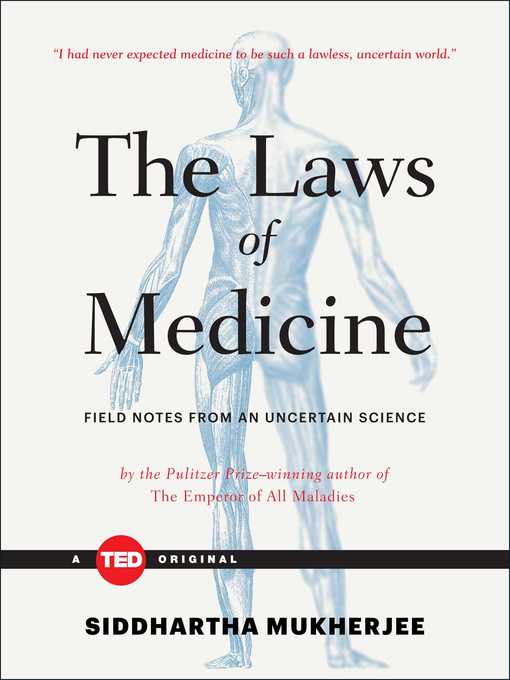
The Laws of Medicine
کتاب های مرتبط
- اطلاعات
- نقد و بررسی
- دیدگاه کاربران
نقد و بررسی

Starred review from January 4, 2016
Mukherjee, an oncologist and Pulitzer Prize winner for The Emperor of All Maladies, brilliantly observes the practice of medicine from a wide angle, offering his perspective on three crucial elements: intuition, statistical outliers, and human bias. He recounts his medical education, both formally and informally, as he delves into the practical lessons he has learned. For example, now that it's possible to cheaply collect reams of genetic data on every patient, understanding those patients who lie outside the parameters of "normalcy" becomes essential. Previously, the one patient responding to an otherwise failed drug was dismissed as an "exceptional responder" and the drug shelved. But now that patient's genes can be sequenced to see mutations for possible drug targeting. Mukherjee advises viewing medicines and surgical procedures "not as therapeutic interventions but as investigational probes." Still, as successes multiply, so do biases. One hospital's new doctors were stunned by a drug's anecdotally high response rate, only to discover that the real rate was only 15%. Hospital staff had given new doctors good responders, afraid they couldn't handle poor ones. The lesson is repeated throughout: bias is fought with solid data and the instincts that grow with experience. Mukherjee has established himself as new medicine's philosopher/poet and has produced a brief, accessible book for patients and practitioners alike.

Starred review from August 15, 2015
Oncologist and Pulitzer Prize winner Mukherjee (Medicine/Columbia Univ.; The Emperor of All Maladies: A Biography of Cancer, 2010) skillfully dives into the hidden side of medicine in this elaboration of the author's 18-minute TED talk. Easily consumed in a single sitting, this brief book concisely explains the author's reasoning of why and how medicine asks its practitioners "to make perfect decisions with imperfect information." The author builds a solid foundation demonstrating the genesis of his concept of establishing laws for the practice of medicine. Cogently moving through books that influenced his thinking and the effects of his medical training and numerous practical experiences with patients, Mukherjee guides readers through his thought process on establishing the laws. The author admits beginning slowly but then spending much of his time during medical school with his "odd preoccupation" researching laws governing his chosen profession. Mukherjee stumbled upon the first law, dealing with intuition, by chance. Another law, regarding issues of medical testing, was refined by his analysis of how data, which doesn't fit accepted models of disease, such as "single patient anecdotes," can point to new methods for interpreting test results. The author deftly examines the diverse personalities and subjects that have influenced his thinking (e.g., 16th-century Danish astronomer Tycho Brahe and early-20th-century physician and scientist Lewis Thomas, author of The Youngest Science); the positive effect of the 20th-century philosophy on therapeutic nihilism; and the utility of the magical laws embraced by the novice witch Hermione Granger of Harry Potter fame. This mininarrative, packed with complex ideas translated into easily accessible language and an engaging style, leaves the readers time to ponder the author's ideas at greater length, and the result is a fascinating and illuminating trek through a beautiful mind. A splendid exploration of how medicine might be transformed.
COPYRIGHT(2015) Kirkus Reviews, ALL RIGHTS RESERVED.

October 15, 2015
Unlike Mukherjee's substantial, Pulitzer Prizewinning The Emperor of All Maladies (2010), this field guide is a slim volume. The Stanford-, Oxford-, and Harvard-educated physician, who now teaches at Columbia University, spells out just three laws: a strong intuition is much more powerful than a weak test; normals' teach us rules; outliers' teach us laws; for every perfect medical experiment, there is a perfect human bias. The prose is lovely, often witty, always clear: The screen everyone for everything' approachDr. McCoy's handheld all-body scanner in Star Trekworks if we have infinite resources and absolutely perfect tests, but it begins to fail when resources and time are finite. Mukherjee tucks in interesting tidbits (the human genome has about 24,000 genes; most women with breast cancer who relapse after surgery do so because the cancer migrates before surgery, not because surgeons left behind remnant scraps of malignant tissue ). As part of the TED series, this accompanies a TED Talk by Mukherjee available at TED.com, and it is a fast and informative read.(Reprinted with permission of Booklist, copyright 2015, American Library Association.)

























دیدگاه کاربران